29 Apr 2020 | News and features
[vc_row][vc_column][vc_column_text]Attacks on press freedom in Europe are at serious risk of becoming a new normal, 14 international press freedom groups and journalists’ organisations including Index on Censorship warn today as they launch the 2020 annual report of the Council of Europe Platform to Promote the Protection of Journalism and the Safety of Journalists. The fresh assault on media freedom amid the Covid-19 pandemic has worsened an already gloomy outlook.
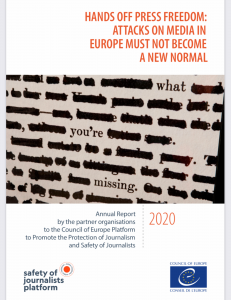 The report analyses alerts submitted to the platform in 2019 and shows a growing pattern of intimidation to silence journalists in Europe. The past weeks have accelerated this trend, with the pandemic producing a new wave of serious threats and attacks on press freedom in several Council of Europe member states. In response to the health crisis, governments have detained journalists for critical reporting, vastly expanded surveillance and passed new laws to punish “fake news” even as they decide themselves what is allowable and what is false without the oversight of appropriate independent bodies.
The report analyses alerts submitted to the platform in 2019 and shows a growing pattern of intimidation to silence journalists in Europe. The past weeks have accelerated this trend, with the pandemic producing a new wave of serious threats and attacks on press freedom in several Council of Europe member states. In response to the health crisis, governments have detained journalists for critical reporting, vastly expanded surveillance and passed new laws to punish “fake news” even as they decide themselves what is allowable and what is false without the oversight of appropriate independent bodies.
These threats risk a tipping point in the fight to preserve a free media in Europe. They underscore the report’s urgent wake-up call on Council of Europe member states to act quickly and resolutely to end the assault against press freedom, so that journalists and other media actors can report without fear.
Although the overall response rate by member states to the platform rose slightly to 60 % in 2019, Russia, Turkey, and Azerbaijan – three of the biggest media freedom violators – continue to ignore alerts, together with Bosnia and Herzegovina.
2019 was already an intense and often dangerous battleground for press freedom and freedom of expression in Europe. The platform recorded 142 serious threats to media freedom, including 33 physical attacks against journalists, 17 new cases of detention and imprisonment and 43 cases of harassment and intimidation.
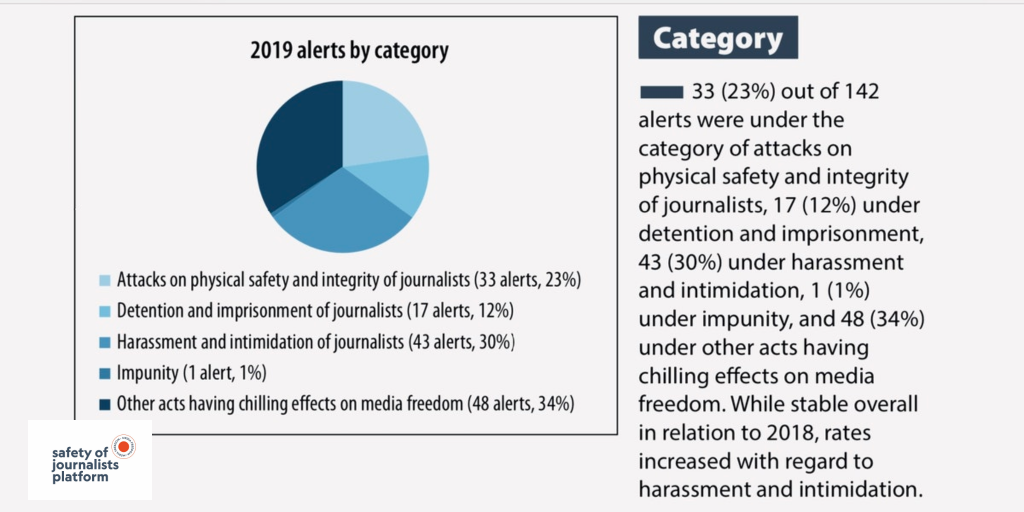
The physical attacks tragically included two killings of journalists: Lyra McKee in Northern Ireland and Vadym Komarov in Ukraine. Meanwhile, the platform officially declared the murders of Daphne Caruana Galizia (2017) in Malta and Martin O’Hagan (2001) in Northern Ireland as impunity cases, highlighting authorities’ failure to bring those responsible to justice. Only Slovakia showed concrete progress in the fight against impunity, indicting the alleged mastermind and four others accused of murdering journalist Ján Kuciak and his fiancée, Martina Kušnírová.
At the end of 2019, the platform recorded 105 cases of journalists behind bars in the Council of Europe region, including 91 in Turkey alone. The situation has not improved in 2020. Despite the acute health threat, Turkey excluded journalists from a mass release of inmates in April 2020, and second-biggest jailer Azerbaijan has made new arrests over critical coverage of the country’s coronavirus response.
2019 saw a clear increase in judicial or administrative harassment against journalists, including meritless SLAPP cases, and spurious and politically motivated legal threats. Prominent examples were the false drug charges filed against Russian investigative journalist Ivan Golunov and the continued imprisonment of journalists in Ukraine’s Russia-controlled Crimea. The Covid-19 crisis has strengthened officials’ tools to harass journalists, with dangerous new “fake news” laws in countries such as Hungary and Russia that threaten journalists with jail for contravening the official line.
Other serious issues identified by 2019 alerts included expanded surveillance measures threatening journalists’ ability to protect their sources, including in France, Poland and Switzerland, as well political attempts to “capture” media through ownership and market manipulation, most conspicuously of all in Hungary. These threats, too, are exacerbated by the actions taken by several governments under the health crisis, which further include arbitrary limitations on independent reporting and on journalists’ access to official information about the pandemic.
Jessica Ní Mhainín, Index’s policy research and advocacy officer, says, “There is a growing pattern of intimidation aimed at silencing journalists in Europe. The situation in Eastern Europe – especially in Hungary, Poland, and Bulgaria – is particularly concerning. But the killing of Lyra McKee shows that we cannot take the safety of journalists for granted anywhere – not even in countries that are seen to be safe for journalists. This report provides an opportunity for us all to come to grips with the serious situation that is facing European media and to remind ourselves of the vital role that the media play in holding power to account.”
Index and the other platform partners call for urgent scrutiny of action taken by governments to claim extraordinary powers related to freedom of expression and media freedom under emergency legislation that are not strictly necessary and proportionate in response to the pandemic. Uncontrolled and unlimited state of emergency laws are open to abuse and have already had a severe chilling effect on the ability of the media to report and scrutinise the actions of state authorities.
While the platform welcomes an increased focus on press freedom by European institutions, including both the Council of Europe and European Union institutions, the ongoing crisis demands more urgent and stringent responses to protect media freedom and freedom of expression and information, and to support the financial sustainability of independent professional journalism. In the age of emergency rule, protecting the press as the watchdog of democracy cannot wait.[/vc_column_text][/vc_column][/vc_row]
25 Mar 2020 | News and features, Press Releases, Statements
[vc_row][vc_column][vc_column_text]Index on Censorship and Justice for Journalists Foundation (JFJ) announce a joint global initiative to monitor attacks and violations against the media, specific to the current coronavirus-related crisis.
According to Rachael Jolley, Editor-in-Chief, Index of Censorship: “In times of extraordinary crisis, governments often take the opportunity to roll back on personal freedoms and media freedom. The public’s right to know can be severely reduced with the little democratic process. Index is already being alerted to attacks and violations against the media in the current coronavirus related crisis, as well as other alarming news pertaining to privacy and freedoms”.
“In our daily work in the post-Soviet region, Justice for Journalists Foundation experts and partners come across grave violations of media freedom and media workers’ human rights. Today, we are witnessing how the corrupt governments and businessmen in many of the regional autocracies are abusing the current limitations of public scrutiny. This major decrease in civil liberties makes pursuing their interests easier and even less transparent, whereas media workers striving to unveil murky practices are facing more risks than ever before”, said Maria Ordzhonikidze, JFJ’s Director.
Index draws on its experience running other mapping projects to enable easy comparisons of media violations in each country, and also so data can be collated and discussed when the global crisis is over.
Justice for Journalists Foundation will contribute to this monitoring effort by expanding cooperation with its existing regional partners who provide data and analysis for the series of Media Threats and Attacks Reports in Azerbaijan, Armenia, Belarus, Georgia, Kazakhstan, Kyrgyzstan, Moldova, Russia, Tajikistan, Turkmenistan, Ukraine and Uzbekistan.
The overall goal of the project is threefold: to increase awareness about the importance of media freedom and the existing state of press freedom at this particular point in history, to support journalists whose work is being impeded, by highlighting the challenges they face to an international audience and to continue to improve media freedom globally in the long run.
Anyone interested to learn more about or contribute to this initiative by providing information on incidents and/or translation, publicity and ideas, please get in touch:
[/vc_column_text][/vc_column][/vc_row]
12 Mar 2020 | News and features, Student Reading Lists
[vc_row][vc_column][vc_column_text]In August 2019 the Indian government under Narendra Modi, leader of the the Hindu nationalist Bharatiya Janata Party, revoked Article 370 of the Indian constitution. The article had granted the state of Jammu and Kashmir the autonomy to write their own constitution and make their own laws. Since the article was revoked, residents of Jammu and Kashmir have been subjected to the world’s longest internet shutdown, a serious breach of their right to free expression and to access information. As the ban on high-speed internet continues, Index looks back on the history of freedom of expression in India, from the years following The Emergency, to the present.

Libya: Criticise & be killed, the December 1980 issue of Index on Censorship magazine
In 1975 Prime Minister Indira Gandhi was convicted of election malpractice conducted during her 1971 campaign. Despite this, she clung onto power and declared a state of emergency which lasted for 19 months, known as The Emergency. During this time, members of the political opposition were imprisoned and the press heavily censored. In this article written in 1980, the year Gandhi was re-elected, Michael Henderson questions if Indian journalists have a long enough memory and a robust enough spirit to stand up to a prime minister with a clear and recent track record of control of the press.
Read the full article[/vc_column_text][/vc_column][/vc_row][vc_row][vc_column][vc_column_text]

Black voices in South Africa, the December 1984 issue of Index on Censorship magazine
In 1984, George Theiner writes of an India still scarred by The Emergency and a visit to Index on Censorship by Mr Justice A N Grover, chairman of the Press Council of India, who took issue with the magazine’s continuing criticism of the Indian press. Theiner interviewed journalists about the future of democracy and a free press under Indira Gandhi. He found a mixture of those who were still in shock about the censorship during The Emergency, and those who were complacent in a belief that it couldn’t happen again. (The future of India under Gandhi came to be something of a moot point as, in October 1984, a few months after this article was published, she was assassinated by her own bodyguards.)
[/vc_column_text][vc_column_text][/vc_column_text][/vc_column][/vc_row][vc_row][vc_column][vc_column_text]
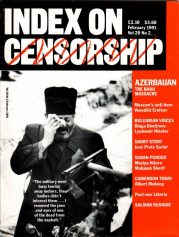
Azerbaijan: the Baku Massacre, the February 1991 issue of Index on Censorship magazine
In 1991 India had a free press… in newspapers. Television and radio were state-owned and state-exploited. Other innovative types of media became a political battleground, with opposition parties promising to release the government’s grip on a news outlet that was fast evolving. Sidharth Bhatia’s piece details the independent video magazines set up by journalists which had to be rented from a video shop. When these magazines became successful, reaching a wide audience and providing information not stifled by a state agenda, government censorship began to encroach upon them.
Read the full article [/vc_column_text][/vc_column][/vc_row][vc_row][vc_column][vc_column_text]
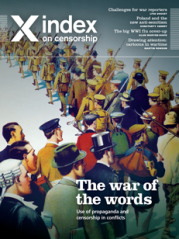
The war of the words, the March 2014 issue of Index on Censorship magazine
Prayaag Akbar examines the role the rich and powerful have in press censorship in India, but in this case it is wealthy business owners, rather than the government, who come under scrutiny. Media outlets who find themselves owned by a large business conglomerate, may then be under pressure to self-censor in order to avoid reporting negatively on the hand that feeds them. Akbar cites examples of the collision of business interests with journalistic integrity as the richest men in India buy up large portions of the national media groups.
Read the full article
[/vc_column_text][/vc_column][/vc_row][vc_row][vc_column][vc_column_text]
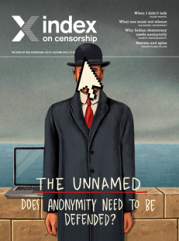
The unnamed, the September 2016 issue of Index on Censorship magazine
Is online anonymity allowing trolls to abuse women without consequences, or it is vital for the safety of those whose expression does not follow the party line? In 2016, as Twitter became more widely used in India, and issues of trolling became apparent, government ministers suggested removing the anonymity of trolls in a bid to increase accountability. Suhrith Parthasarathy reports on how state involvement with online expression could lead to the anonymity of activists being revoked to protect state interests.
Read the full article[/vc_column_text][/vc_column][/vc_row][vc_row][vc_column][vc_column_text]
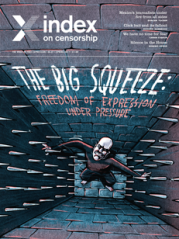
The Big Squeeze, the April 2017 issue of Index on Censorship magazine
In November 2016, a Supreme Court order made it obligatory to stand during the national anthem, which is played in Indian cinemas before the film begins, equating being patriotic with being a law-abiding citizen. Lawyer and writer Suhrith Parthasarathy examines the legal complexities of enforcing shows of patriotism in a country whose constitution guarantees freedom of expression, and speaks to people who have been subject to police interviews for choosing to stay seated.
Read the full article[/vc_column_text][/vc_column][/vc_row][vc_row][vc_column][vc_column_text]
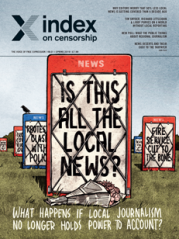
Is This All the Local News?, the April 2019 issue of Index on Censorship magazine
Rituparna Chatterjee reports on the importance of local news, and threats faced by local news journalists in India. Journalists working in rural parts of India can face pay too low to survive on, and can be susceptible to bribes from local police officers and politicians, keen to censor scandals. Chatterjee also highlights how tribal and indigenous communities can end up excluded from the national narrative of India when large media conglomerates do not report on issues in the areas they live in.
Read the full article[/vc_column_text][/vc_column][/vc_row][vc_row][vc_column][vc_column_text]
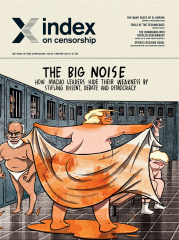
The Big Noise, the December 2019 issue of Index on Censorship magazine
The Emergency of 1975-1977 has been seen in later years as a blip in freedom of expression in India. However, since the election of Modi to prime minister in 2014, freedom of expression in India is taking a hit. Modi’s supporters are instilling fear and committing violence against those considered outsiders, often Muslims. Such violence is not being roundly condemned by their leader; his silence is taken as tacit approval. Meanwhile the internet shutdown imposed on Kashmir has not been fully lifted, an attack on access to information.
Read the full article[/vc_column_text][/vc_column][/vc_row]
7 Feb 2020 | News and features, Statements
[vc_row][vc_column][vc_column_text]We live in the midst of radical changes to the ways people access news and information.
When Index on Censorship was founded nearly 50 years ago, few could have foreseen the manner in which technology would now be changing the ways we engage with politics and democracy. Although the landscape of communication has changed, threats to freedom of expression remain as grave as they were 50 years ago – in the UK and around the world.
Index is looking for a resourceful and outspoken leader to steer the organisation through this changing terrain, and to protect the right for everyone to be free to express themselves without fear of harm or persecution – no matter what their views. From tackling legislative threats to digital freedom at home, to spotlighting issues of repression and censorship in China, Russia and Azerbaijan, we are seeking a Chief Executive to put free speech for everyone at the forefront of the political, campaign and news agenda.
What you will do
Index on Censorship has a small team that punches well above its weight. You will ensure the organisation is well run and enjoys a healthy office culture, strong relationships with the board and diligent financial management, so that we are well set to protect freedom of expression for another fifty years.
You will be the main outward face of Index on Censorship and build that presence on broadcast media, in the papers and on social media. You will be confident in championing the cause of freedom of expression and when explaining why it must be protected as a universal right for all, even at times when others are looking to close down conversations.
You will be an excellent fundraiser, nurturing relationships and developing philanthropic partnerships which allow us to continue our advocacy campaigns, our magazine and our projects to support freedom of expression. We have a strong board with which you will work closely, while also building your own networks, to ensure we receive the financial backing we need from private individuals, corporates and foundation trusts.
You will build Index on Censorship as both a publisher of freedom of expression and a campaign organisation – a leader in advocacy for freedom of expression, ensuring that voices are heard beyond those normally associated with our cause. Through building strong partnerships and networks you will enable us to grow our capacity to advocate for individuals and groups, including to the government.
Key Components of the Role
(1) Fundraising and Finance
- Lead fundraising and be successful at bringing in funding from a variety of sources.
- Work closely with the board, both on our strategic vision for fundraising and on building new donor relationships.
- Use your contact book and leverage the board’s contacts in order to build relationships to benefit the organisation.
- Proactively seek opportunities to diversify the funding base and attract a wider range of funders.
- Lead on and manage proposal-writing for both core and project funding.
- Ensure obligations and reporting to funders are fulfilled.
- Be in regular contact with donors and take proactive care of donor relationships.
(2) Campaigning, Advocacy and Publishing
- Be the main public face of the organisation with excellent written and oral communication skills for a range of audiences, including interacting with politicians, opinion-formers and media as well as broader general public audiences.
- Lead senior management on setting and implementing Index’s priority range of campaigns, advocacy projects, editorial and events.
- Lead with key staff on defining policy positions across a range of free expression issues. Identify where Index can take clear, unambiguous positions and where there are complex, grey issues that may need more debate and analysis.
- Identify and build relationships with expert analysis and key opinion formers who can contribute usefully to our policy work
- Build coalitions where necessary with partner organisations on shared policy objectives
- Sign-off and provide strategy guidance on key policy statements and policy papers, delegating where appropriate
- Work closely with the editor-in-chief who manages our historic magazine and our online editor and leads on the relationship with Index magazine publishers, Sage.
- Lead on, and develop, the Index on Censorship Freedom of Expression Awards.
(3) Strategic Leadership
- Lead on developing and implementing strategic vision and framework; setting clear programmes of activities within overarching goals and priorities, in cooperation with the senior management team and staff.
- Report to and work with the chair and board in ensuring good governance, finances, strategy and risk management. Prepare quarterly board meetings and relevant reporting requirements with the Finance Director.
- Lead and develop rolling, state-of-the art evaluation and impact assessments ensuring all Index’s external-facing activities are high impact, increasing our influence and audiences.
- Oversee work outputs delivered to high standards and deadline.
- Build the team – the CEO will be an excellent team player as well as leader, ensuring integrated working across Index, encouraging creativity and innovation.
- Encourage staff appreciation of both mission and strategy and their role in it
- Line-manage senior staff and lead the senior management team.
Requirements
The successful applicant will be expected to demonstrate the following:
- A commitment to freedom of expression
- Excellent fundraising skills with proven experience of all areas of fundraising including grant and bid writing
- Excellent communication and media presentation skills
- Excellent political and policy knowledge and experience of advocacy
- In-depth knowledge of international current affairs, especially concerning issues of freedom of expression, digital and media freedom
- The ability to build relationships and networks with partners and stakeholders
- Strategic and staff management, as part of leadership experience at a senior level
- Management experience of managing change and growth
- A great contact book and ability to use your networking ability to grow funding and opportunities for the organisation
- Knowledge of freedom of expression issues in relation to the digital world
The following knowledge, skills and experience are desirable:
- An established public profile
- Knowledge of foreign languages
- Experience in addressing global freedom of expression issues
- Knowledge of the civil liberties/human rights sector
Salary: £70-80k per annum based on experience
Hours: Full time, some national and international travel and flexible working required
Based: Our offices near Old Street, London
Recruitment timetable
Friday 13th March Closing date for applications
Monday 16th March First round interviews with board representatives
Monday 30th March Second round interviews with staff and board
How to apply
Send your CV and a cover letter of no more than three A4 pages outlining your suitability for the role to [email protected] by Friday 13th March[/vc_column_text][/vc_column][/vc_row]
 The report analyses alerts submitted to the platform in 2019 and shows a growing pattern of intimidation to silence journalists in Europe. The past weeks have accelerated this trend, with the pandemic producing a new wave of serious threats and attacks on press freedom in several Council of Europe member states. In response to the health crisis, governments have detained journalists for critical reporting, vastly expanded surveillance and passed new laws to punish “fake news” even as they decide themselves what is allowable and what is false without the oversight of appropriate independent bodies.
The report analyses alerts submitted to the platform in 2019 and shows a growing pattern of intimidation to silence journalists in Europe. The past weeks have accelerated this trend, with the pandemic producing a new wave of serious threats and attacks on press freedom in several Council of Europe member states. In response to the health crisis, governments have detained journalists for critical reporting, vastly expanded surveillance and passed new laws to punish “fake news” even as they decide themselves what is allowable and what is false without the oversight of appropriate independent bodies.








